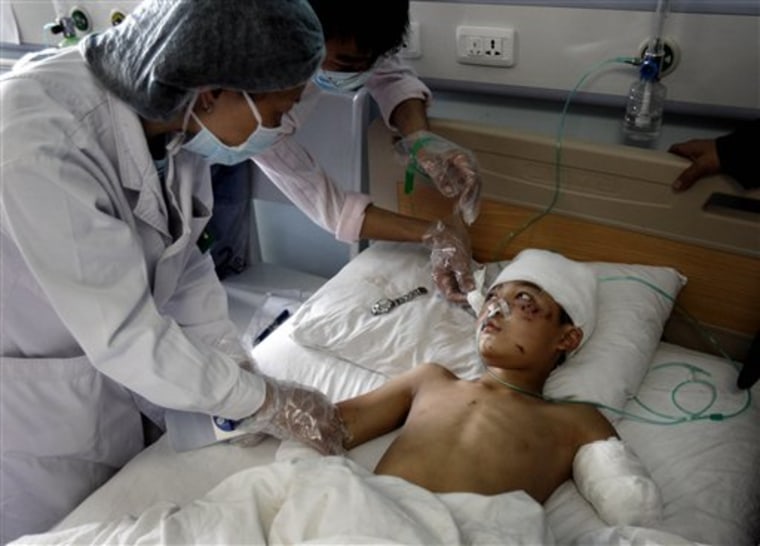After 11-year-old Zhang Jiazhi crawled free of the rubble that remained of his middle school, his parents began a 20-hour ordeal to get medical care for their son, whose arms were crushed to a pulp.
Jiazhi survived. But with care delayed for nearly a day, the boy who loved to play pingpong and carve wooden toys for his friends, had to have both his arms amputated.
"I tried to ask the doctor to at least save his right hand, which he writes with. But they said it was too late," said the child's father, Zhang Qingyou, a look of sad resignation etched across his high cheekbones.
Getting care in China's disaster zone following Monday's massive earthquake is a struggle. Hospitals, medicine, blood, needles, doctors — everything is in short supply, except for the injured.
Desperate search for help
For Jiazhi, the nearest hospital to his farming village was rattled by aftershocks Monday and the boy was turned away. His parents rushed with their son to the city's main square, which was turned into an enormous triage center. It teemed with thousands of injured, overwhelming doctors as they jostled to get on ambulances.
Jiazhi and his parents squeezed into an ambulance with nine other people, finally making their way to Deyang City People's Hospital, the largest in an area of several quake-devastated counties. After waiting for hours in the packed emergency room, the boy was sent to an operating room, where, along with seven other patients lying side-by-side, doctors performed surgeries at the same time.
But it was too late.
The doctors couldn't save his arms, the boy's father said, because "after two hours, they said the nerves and blood vessels die and there's no way to get it back to normal."
Across the earthquake zone, many hospitals were obliterated or rendered unsafe. Numerous makeshift care centers have sprung up on the front lines of badly damaged towns. All are overwhelmed with injured still pouring in from hard-hit areas three days after the quake killed nearly 20,000 people.
"What do we need? We just need some rest," said Wu Tianfu, a doctor at a tent set up by the Red Cross Society of China in the town of Hanwang, where hundreds of school children died.
"Then we need gloves, masks, iodine, sutures, cold medicine," said Wu. "It's a long list."
'Insufficient' public health care
The disaster has hit a health system that has been sorely neglected in China's spectacular economic rise. Underfunded by the government and unaffordable to most, health care is poor in inland areas like Sichuan province, where the magnitude-7.9 quake struck, highlighting the yawning gap between prosperous urban dwellers and struggling rural Chinese.
"The public health care system in China is insufficient," Vice Minister of Health Gao Qiang told reporters in Beijing on Thursday. He suggested the government would pick up the costs of care to earthquake victims, many of whom have little or no insurance. "The government should be responsible for providing medical treatment to them," he said.
At Deyang City People's Hospital, where more than 1,000 injured have been treated, supplies of blood, disinfectants and needles were used up in the first two days, according to the hospital's Communist Party secretary. Operating rooms were moved from the 12th to the second floor in case of large aftershocks.
'They just keep coming'
Every few minutes, ambulances rushed up to the 800-bed facility, carrying people wrapped in quilts, their faces swollen and crusted with blood. Teams of doctors and nurses immediately swabbed their wounds with alcohol and murmured diagnoses.
"They just keep coming, group after group of people who are hurt," said Dr. Deng Xiaoling, examining a crying 11-year-old girl, her back, head and legs gashed after escaping from the ruins of her school in Hanwang.
"Under normal circumstances, the children shouldn't have complications," said Deng. "But now the weather is very hot, they aren't eating, their immune system is weak and this could lead to complications or problems that we don't want to face."
In the emergency room driveway, a handwritten list was tacked to a notice board with name after name of the injured. "These numbers are not complete," it said.
Nearby, makeshift shelters fashioned from plastic sheets were crammed. Patients, their limbs wrapped in thick gauze bandages, were hooked up to intravenous tubes. Relatives surrounded them and volunteers offered porridge, cakes and sweets.
On Monday, Jiazhi was on the second floor of his school in Libing, a village outside the city of Shifang, when the quake struck. Two chemical plants in Shifang collapsed and more than 600 people were buried.
'Hasn't talked since the operation'
Jiazhi was among the last to leave his school before it crumbled. Knocked over by debris, he was helped up by a classmate and stumbled out of the building, his scalp gouged by chunks of concrete.
"His flesh was ripped from his arms. I could see his bones," said the boy's father, who had rushed to the school when the ground began to shake.
On Thursday, Jiazhi lay in a hospital bed, his left arm amputated just below his elbow, his right arm cut off below the shoulder. He stared silently ahead, his cut and swollen face expressionless.
His mother, Lin Yiping, said her son was at the top of his class and always went to school early to sweep the floors. He loved riding his bicycle and his toys, imaginative creations he carved himself, were a favorite among his friends.
"He hasn't talked since the operation," said Lin, sobbing. "He's only cried once since the earthquake, when they told him he no longer had his arms."
